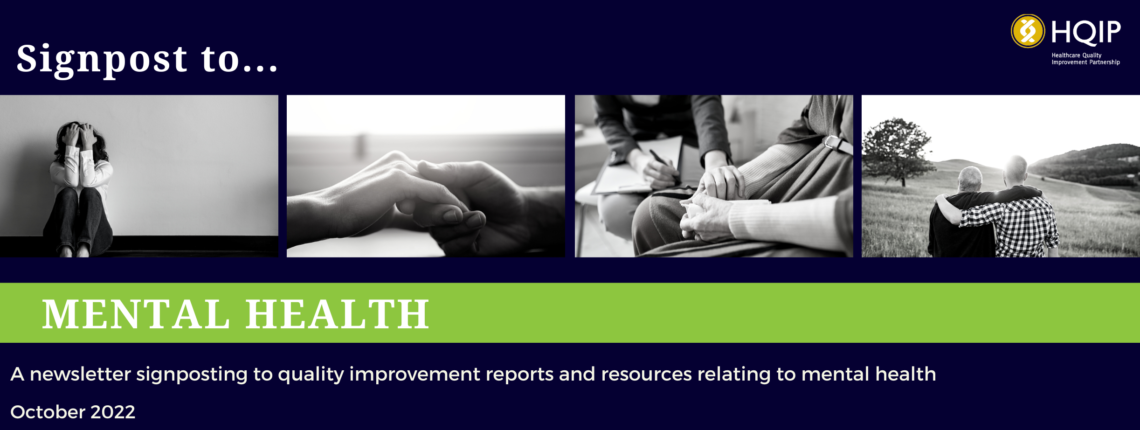
Mental health newsletter
Published: 04 Oct 2022
“We are the delay factors, the stumbling blocks. We are the interventions, the vigilance. We are the artwork on the walls of single rooms bright with colour and no curtain rails,” We Don’t Accept the Inevitability by Char March (for NCISH)
Welcome to our latest themed update, following on from the first two editions on Maternity and Newborn care and Children & Young People earlier in 2022. In light of the release of a Mental health spotlight report from the National Audit of Care at the End of Life (NACEL) as well as two reports (focusing on England and Wales respectively) on early intervention from the National Clinical Audit of Psychosis (NCAP), as well as in recognition of World Suicide Prevention Day last month, we have decided to focus on quality improvement in relation to mental health in this edition. This subject choice is also particularly pertinent because of the COVID-19 pandemic and lockdown, with mental health now being one of the biggest public health challenges we face.
In addition to the latest reports from relevant audits, this update brings together some of the key information available from both HQIP and the sector – and so is a useful summary for anyone working in this field.
| Please share: Help to update your colleagues by forwarding to anyone working in this field (if you receive this update and you are not on HQIP’s mailing list, you can subscribe to future updates here). You can also stay up-to-date by following us on twitter: @HQIP. |
Contents
- Latest from HQIP: Reports, resources and updates
- Look again: Past reports relating to mental health
- Engaging with patients: Case study, art and poetry
- Provider updates: More resources from HQIP’s audits and programmes
- Sector round-up: Reports; Resources and updates
- Long read (blog): How to support a child or young person if you’re concerned about their mental health
- Help in a crisis
- And finally: Further resources from HQIP
Latest from HQIP
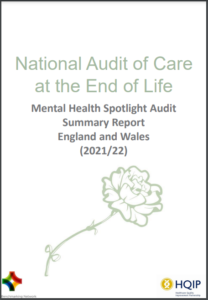 National Audit of Care at the End of Life (NACEL): Mental health spotlight report
National Audit of Care at the End of Life (NACEL): Mental health spotlight report
Based on data collected between June and October 2021, this report sets out the findings of the Mental Health Spotlight Audit and compares the results with acute and community findings, where appropriate. Key findings include:
- For communication with the dying person and individualised care planning, mental health providers had better results than acute and community trusts
- Involvement in decisions regarding end of life care was reported to be in line with acute and community trusts
- There were three key audit themes where results for mental health providers were lower than those reported for acute and community hospitals: Governance structures and processes; workforce/specialist palliative care availability and input; and staff reported feedback on confidence to manage end of life.
READ IN FULL: The full report, with all key findings and recommendations, can be found here.
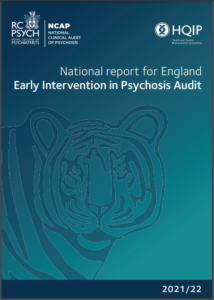 National Clinical Audit of Psychosis (NCAP): Early intervention report (England)
National Clinical Audit of Psychosis (NCAP): Early intervention report (England)
This 2021/22 report is based on data from 10,557 casenotes submitted by 54 Trusts in England, and presents national and organisation-level findings on services provided to people with first-episode psychosis (FEP). Key findings include:
- 80% of people with FEP received all seven physical health screens, a 10% increase from the previous audit
- 71% of people with FEP received all relevant interventions for their physical health, a 10% increase from the previous audit
- For children and young people, improvements were found in relation to clozapine prescribing, physical health screening and interventions, and carer focused education and support programmes.
READ IN FULL: The full report, with all key findings and recommendations, can be found here.
 National Clinical Audit of Psychosis (NCAP): Early intervention report (Wales)
National Clinical Audit of Psychosis (NCAP): Early intervention report (Wales)
This 2021/22 report is based on 239 casenotes submitted by six Health Boards in Wales, and presents national and Health Board-level findings on services provided to people with first-episode psychosis (FEP). Key findings include:
- 85% of people with FEP who had not responded adequately to treatment with at least two antipsychotic drugs were offered clozapine.
- 36% of people with FEP who were not in work/education took up a supported employment and education programme
- 51% of people with FEP received all seven physical health screenings (27% increase from previous audit)
- All teams have a Children and Young People (CYP) EIP provision (44% increase from previous audit).
READ IN FULL: The full report, with all key findings and recommendations, can be found here.
Coming soonHQIP is responsible for a number of national healthcare quality improvement programmes, including the National Clinical Audit and Patient Outcomes Programme (NCAPOP) on behalf of NHS England. As such, we manage the publication of reports from over 40 audits and programmes. Find below details of up-and-coming reports relating to mental health: Mental health sprint audit (England only) Annual report 2023 STAY UP-TO-DATE: For notifications when these reports become available, sign up to HQIP’s mailing list to receive our monthly eBulletins. *These dates are indicative and subject to change – a full up-to-date publication schedule from HQIP can be found here. |
Look again
Past reports
HQIP has an unparalleled repository of reports and other resources to support quality improvement and clinical effectiveness in healthcare services. In addition to recent reports above, find below a summary of past reports relating to mental health (with publishing date in brackets):
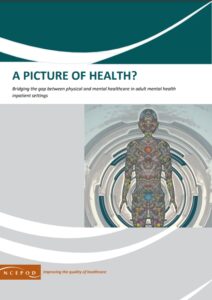 |
National Confidential Enquiry into Patient Outcome Death (NCEPOD): A Picture of Health? report and infographic (May 2022). |
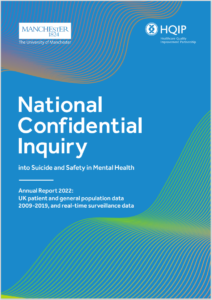 |
National Confidential Inquiry into Suicide and Safety in Mental Health (NCISH) annual report and infographic (April 2022). |
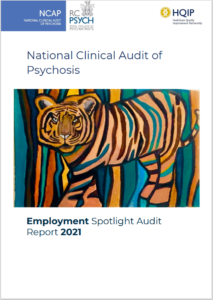 |
National Clinical Audit of Psychosis (NCAP): Employment spotlight audit 2021 report and infographic (December 2021). |
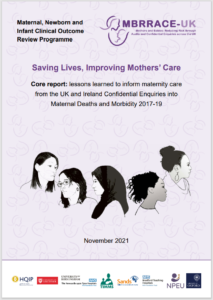 |
Maternal, Newborn and Infant Clinical Outcome Review Programme: Saving Lives, Improving Mothers’ Care report, which includes a chapter on deaths of women with mental ill health (November 2021). |
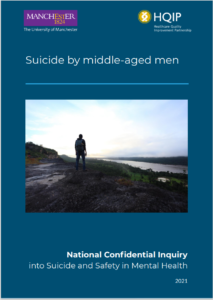 |
National Confidential Inquiry into Suicide and Safety in Mental Health (NCISH) Suicide by middle-aged men report and services / service user infographics (May 2021). |
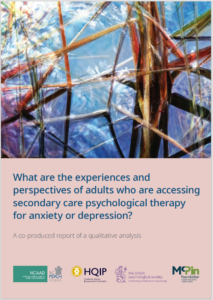 |
National Clinical Audit of Anxiety and Depression (NCAAD): Psychological Therapies Spotlight report (July 2020). |
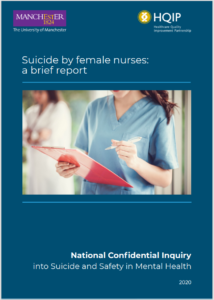 |
National Confidential Inquiry into Suicide and Safety in Mental Health (NCISH) Suicide by female nurses report (June 2020). |
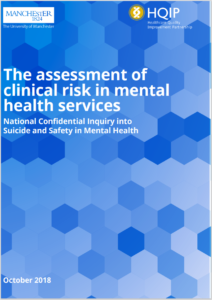 |
National Confidential Inquiry into Suicide and Safety in Mental Health (NCISH) Assessment of clinical risk in mental health service report (Oct 2018). |
FURTHER RESOURCES: More reports, infographics and resources to support quality improvement on a wide range of clinical disciplines can be found on the Resources section of our website.
National Child Mortality Database (NCMD): Suicide in Children and Young PeopleThis report from October 2021, was designed to identify the common characteristics of children and young people who die by suicide, investigate factors associated with these deaths and identify common themes to help inform professionals. READ IN FULL: The report can be read in full here. NCMD has also published a report on Child Suicide during the COVID-19 Pandemic in England. |
Engaging with patients
“Mental health policy and practice must be grounded in objective evidence rather than mental health hysteria; we need clinical audit and not fake facts,” member of HQIP’s Service User Network (SUN)
To reach a broad audience, and to engage patients specifically, it is important to utilise a wide range of communication tools. Find below two interesting examples that involve art and poetry respectively to engage their communities:
- The cover image ‘The Teal Tiger’ for the National Clinical Audit of Psychosis (NCAP) Employment Spotlight report was created by one of their service user advisors, Veenu Gupta.
- National Confidential Inquiry into Suicide and Safety in Mental Health (NCISH): As writer-in-residence for NHS North West R&D, Char March wrote a series of poems to utilise the power of creativity in conveying key messages. Find out more about NCISH’s work to engage service users and carers here.
“Figures join hands, a paperchain fence of: statistics and research papers, probabilities and risk factors,” Escarpment, Char March
CASE STUDY: National Clinical Audit of Anxiety and Depression (NCAAD)At HQIP we are proud to say that involving patients and carers is at the heart of everything we do. Part of this endeavour is the Richard Driscoll Memorial Award (RDMA), which celebrates best practice in meaningful public and patient involvement within HQIP commissioned programmes. Of particular relevance here is a case study from the National Clinical Audit of Anxiety and Depression (NCAAD), previously commissioned by HQIP, which outlines a shared decision-making process with a patient group and demonstrates the impact of service-user involvement. READ IN FULL: Patient & Public Involvement (PPI) in national clinical audit: NCAAD case study 2019. |
Provider updates

In addition to HQIP-commissioned reports and outputs, the organisations that run our audits and programmes (our providers) produce a range of useful materials and tools. Find below some key resources in relation to mental health:
The Mental Health Clinical Outcome Review Programme, delivered by the National Confidential Inquiry into Suicide and Safety in Mental Health (NCISH), University of Manchester:
- Further resources to support their HQIP-commissioned Suicide by middle-aged men report, including an animated video.
- Further resources to support their HQIP-commissioned Assessment of clinical risk in mental health service report, including a video of the key messages.
- Safer services toolkit: For self-assessment by mental health care providers, it presents the 10 key elements as quality and safety statements about clinical and organisational aspects of care.
- Toolkit for self-harm: For self-assessment based on the NICE Quality Standard for Self-Harm.
- 8th NCISH conference (May 2022) resources eg findings and recommendations from NCISH’s 2022 Annual Report as well as a number of videos including 3 Dads Walking.
The National Clinical Audit of Psychosis (NCAP), delivered by the Royal College of Psychiatrists:
- Quality improvement (QI) webinars, designed for EIP services, QI and governance personnel, EIP team clinicians and other interested staff.
- Data tables: Casenote audit data submitted by individual Trusts in NCAP, measured against a checklist of standards for each round of the audit.
- Survey of Early Intervention in Psychosis (EIP) provision to under 18s with a First Episode of Psychosis, by Children and Young People Mental Health (CYP MH) teams and dedicated EIP teams for Children and Young People.

Sector round-up
Find below a short overview of some of the key reports and resources on mental health from the wider healthcare sector. We recognise that many have been published for some time and are well-known (and well used), but they have been included here nonetheless as they remain useful to anyone working in this field…
Reports
From the NHSMental Health Implementation Plan 2019/20 – 2023/24 A key document from the NHS that provides a framework to deliver on the commitment to pursue the “most ambitious transformation of mental health care England has ever known” at a local level. READ in full here. Mental health clinically-led review of standards Sets out the range of support received through the national consultation on the proposed new standards for mental health care, and includes considerations to support their successful implementation. READ in full here. |
Other reports and articles of interest include:
- Transforming mental health in your community: a local guide to delivering the NHS Long Term Plan by mental health charity Mind.
- Bereavement and suicide bereavement as an antecedent of suicide in children and young people: prevalence and characteristics. Journal of Affective Disorders, 2022.
- World mental health report: Transforming mental health for all. World Health Organization, 2022.
- The Parallel Pandemic: COVID-19 and Mental Health. Northern Health Science Alliance, 2022.
- How are we doing? Centre for Mental Health, 2022.
- Suicide rates by ethnic group among patients in recent contact with mental health services: an observational study in England and Wales, 2007-2018. Lancet Psychiatry, 2021.
- Mental Health of Children and Young People in England 2021 by NHS Digital. Explores the mental health of children and young people during the COVID-19 pandemic, 2021.
- Suicide rates among patients subject to community treatment orders in England, 2009-2018. JPsych Open, 2021.
Resources and guidance
NEW: Guidance on self harm from NICE, September 2022
The National Institute for Health and Care Excellence (NICE) has published a set of materials for professionals in relation to self harm. This includes guidance (assessment, management and preventing recurrence), as well as a supporting video and podcast, both by NICE topic expert Professor Nav Kapur.
From NHS EnglandCore20PLUS5 is NHS England and NHS Improvement’s approach to supporting the reduction of health inequalities that identifies ‘5’ focus clinical areas requiring accelerated improvement, one of which is Severe Mental Illness (SMI). Further information, tools and guidance to support mental health commissioning and the transformation of services from NHS England can be found here. |
Other useful resources include:
- Working Well Together by the Royal College of Psychiatrists to support delivery of the Five Year Forward View for Mental Health and the NHS Long Term Plan.
- Advancing Mental Health Equality toolkit, also by the Royal College of Psychiatrists.
- Implementing the Early Intervention in Psychosis Access and Waiting Time Standard guidance by NHS England / NICE.
- Perinatal Mental Health Care Pathways from NHS England.
- A suite of resources from Mental Health UK including conversation guides, posters and top tips.
- Resources for professionals working with young people from Young Minds.
- NHS-Led Provider Collaboratives: specialised mental health, learning disability and autism services, with animated video.
Mental health reformKey resources relating to the Independent Review of the Mental Health Act and mental health reform include:
|
Long read (blog)
How to support a child or young person if you’re concerned about their mental health
Professor Prathiba Chitsabesan for NHS England, updated February 2022
“For children and young people who are experiencing persistent symptoms which are impacting on their day to day lives…the NHS is here for those who need more help”
There have been a lot of changes over recent years, due to COVID and its resultant effects. This blog provides critical advice for those caring for young people in crisis which, by default, will be useful to anyone working with young people in relation to mental health.
Read this blog in full here.
Help in a crisis
If you, or someone you are supporting, is struggling with mental health, then the NHS can signpost you to relevant information and support, and advise where to get urgent help if needed.
Find out more here.
And finally
Further resources from HQIP
Regardless of your clinical practice area, the following resources may be of interest to you if you are involved in quality improvement or audit:
- The National Clinical Audit Benchmarking (NCAB) website from HQIP provides a visual snapshot of individual Trust audit data set against individual national benchmarks.
- HQIP’s eLearning area with free-to-use education packages related to clinical audit and healthcare quality improvement.
- Resources for trainee doctors: A set of tools and information to help trainee clinicians with navigating quality improvement.
- Assorted guidance for professionals in the field.
Tell us what you think? We are always interested to receive your feedback and, as this is a relatively new style of newsletter, we are particularly keen to hear from you.
Please send any comments to [email protected].







